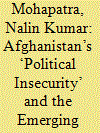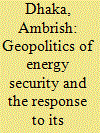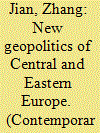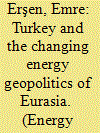|
|
|
Sort Order |
|
|
|
Items / Page
|
|
|
|
|
|
|
| Srl | Item |
| 1 |
ID:
173226


|
|
|
|
|
| Summary/Abstract |
The ‘sustainable peace’ is eluding Afghanistan over centuries. This can largely be attributed to both external geopolitical factors as well as the internal domestic realignments. Often these two factors operate in isolation and at times collude with each other, thus accentuating both domestic and regional instability. The fallout of protracted conflict in Afghanistan in the last few decades has resulted in the emergence of weak governance structure along with the proliferation of radicalism and the flow of narcotics to the neighbouring regions. Eurasia is one such region which has largely been affected by the developments in Afghanistan. The Eurasian states’ engagement with Afghanistan can be looked both through the prism of geopolitical developments that took place in the region following the collapse of the Soviet Union and post-9/11 developments which resulted in the intervention of external actors. The present geopolitical imbroglio is largely emanating from the decision of the United States to leave Afghanistan and the Russian’s desire to fill the vacuum. Iran and China are also engaged in shaping the geopolitical dynamics of this trouble-torn state. India, on the other hand, perceives security and stability of Afghanistan are important for greater regional economic cooperation which will facilitate its effective engagement in Eurasia.
|
|
|
|
|
|
|
|
|
|
|
|
|
|
|
|
| 2 |
ID:
089541


|
|
|
|
|
| Publication |
2009.
|
| Summary/Abstract |
Eurasian Geopolitics as explained in the Heartland model has been reincarnated as Energy Geopolitics. Germany and India are the two strategic economies of the Inner Crescent of Mackinder's 'Heartland' Model and are largely similar in geopolitical focus to the rest of Eurasia. The article argues that in the coming decades at least, Russia will play an important role in these countries' energy vision. A similar unique convergence of goals regarding energy technology requirements will also be seen in the coming decades. India cannot abandon the developmental needs of its one billion plus people to the energy monopolies. Neither does Germany as a significant global economy wish to hang its globalisation efforts on similar energy uncertainties. Both countries therefore seek to spread their energy security through technology-centred geopolitical pluralism. Central Asian energy resources thus seem to be a geopolitical temptation that both nations find hard to ignore. Geopolitical contingencies, it is argued, might bring them together to explore a mixed set of options under some kaleidoscopic combination of an altogether new energy vision.
|
|
|
|
|
|
|
|
|
|
|
|
|
|
|
|
| 3 |
ID:
149457


|
|
|
|
|
| Summary/Abstract |
Central and Eastern Europe is located between the East and the West. Big powers have traditionally competed for influence in the region and limited independence. After the Cold War, most of Central and Eastern Europe joined the EU and NATO and focused on political and economic transformations. Mostly these processes went smoothly and the region lost the world’s attention. However, in recent years, as Eurasian geopolitics has changed, especially after the outbreak of the Ukrainian Crisis, competition in the region has grown more intense. This situation is partly due to the region’s geography, history and development, which have traditionally made them targets for other powers to divide between them or to court favor. However, countries in the region no longer want to be puppets, they want to wrest control of their own destiny by playing the powers off against each other, so the geopolitical situation is now presenting a new picture.
|
|
|
|
|
|
|
|
|
|
|
|
|
|
|
|
| 4 |
ID:
115038


|
|
|
|
|
| Publication |
2012.
|
| Summary/Abstract |
Much has been made about a revival of Mackinderian geopolitics in Eurasia, largely centred on struggles over access to energy resources and rooted in a territorial understanding of space. This paper proposes that the conceptual political cartography of Eurasia is indeed largely being rewritten, but conventional understandings of space, territory, and resources are insufficient in providing insight into a changing geopolitics. We interrogate the geographical logics of Russia's role as energy provider to Europe by focusing specifically on the provision of gas to Europe via Nord Stream, a new underwater pipeline that is scheduled to go online by late 2011. Drawing on debates in human geography on relational/topological views of space, and on the "splintering urbanism" thesis, the paper describes a rapidly evolving networked space that effectively "splinters" the territorial integrity of the region and thereby complicates notions of Eurasian geopolitics that emphasise proximity, territorial hegemony, and state-centric international relations.
|
|
|
|
|
|
|
|
|
|
|
|
|
|
|
|
| 5 |
ID:
166380


|
|
|
|
|
| Summary/Abstract |
While Turkey's geographical location is usually viewed as a major advantage in the energy sphere, since many countries in its immediate neighbourhood require active Turkish collaboration in order to export or import oil and natural gas via economically feasible pipeline projects, the ongoing political, economic and military conflicts between the same global and regional actors not only negatively affect the development of the energy transportation routes in Eurasia, but also present a major foreign policy challenge for Ankara that has traditionally sought to maintain a careful balance in its relations with the West and Russia. The goal of this article is to elaborate on the influence of such geopolitical factors in evaluating Turkey's role in terms of the oil and natural gas pipelines that are either planned or already under construction to connect the various sub-regions of Eurasia. Employing a traditional geopolitical approach, it seeks to understand what kind of geopolitical factors come into play regarding Turkey's role in the changing energy geopolitics of Eurasia and in what ways these geopolitical factors strengthen or weaken Turkey's objective to be perceived as a regional energy hub by other actors.
|
|
|
|
|
|
|
|
|
|
|
|
|
|
|
|
|
|
|
|
|